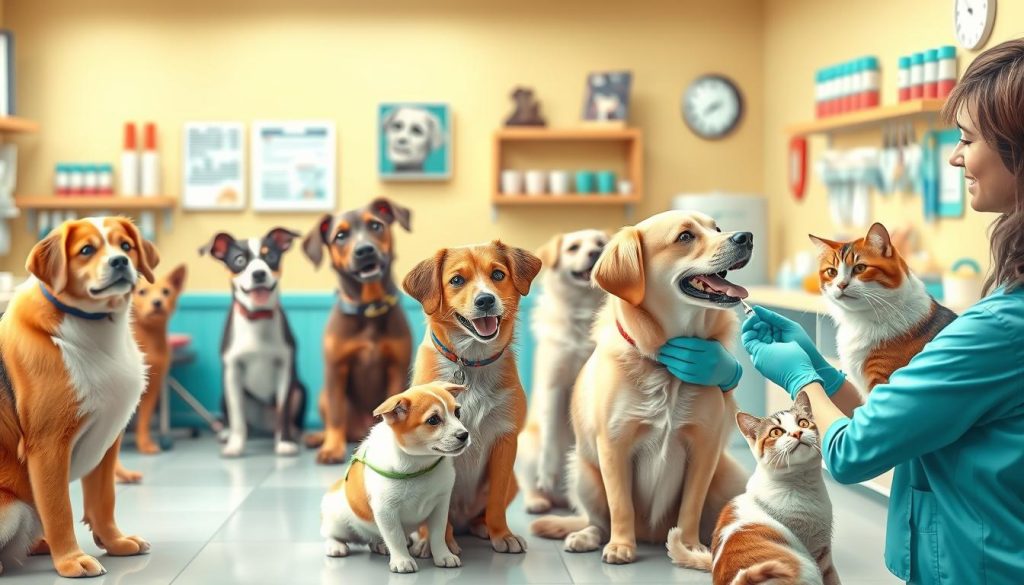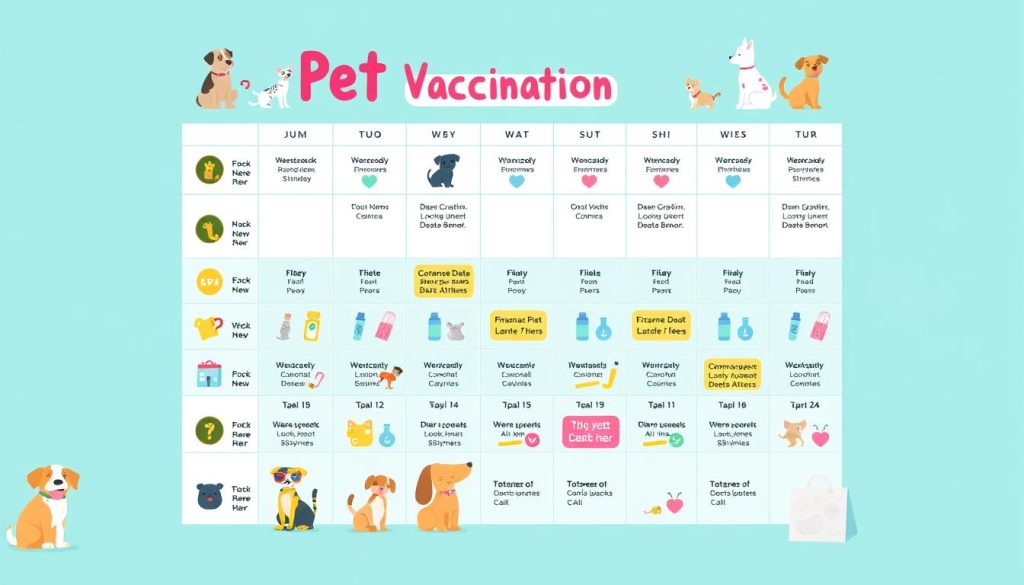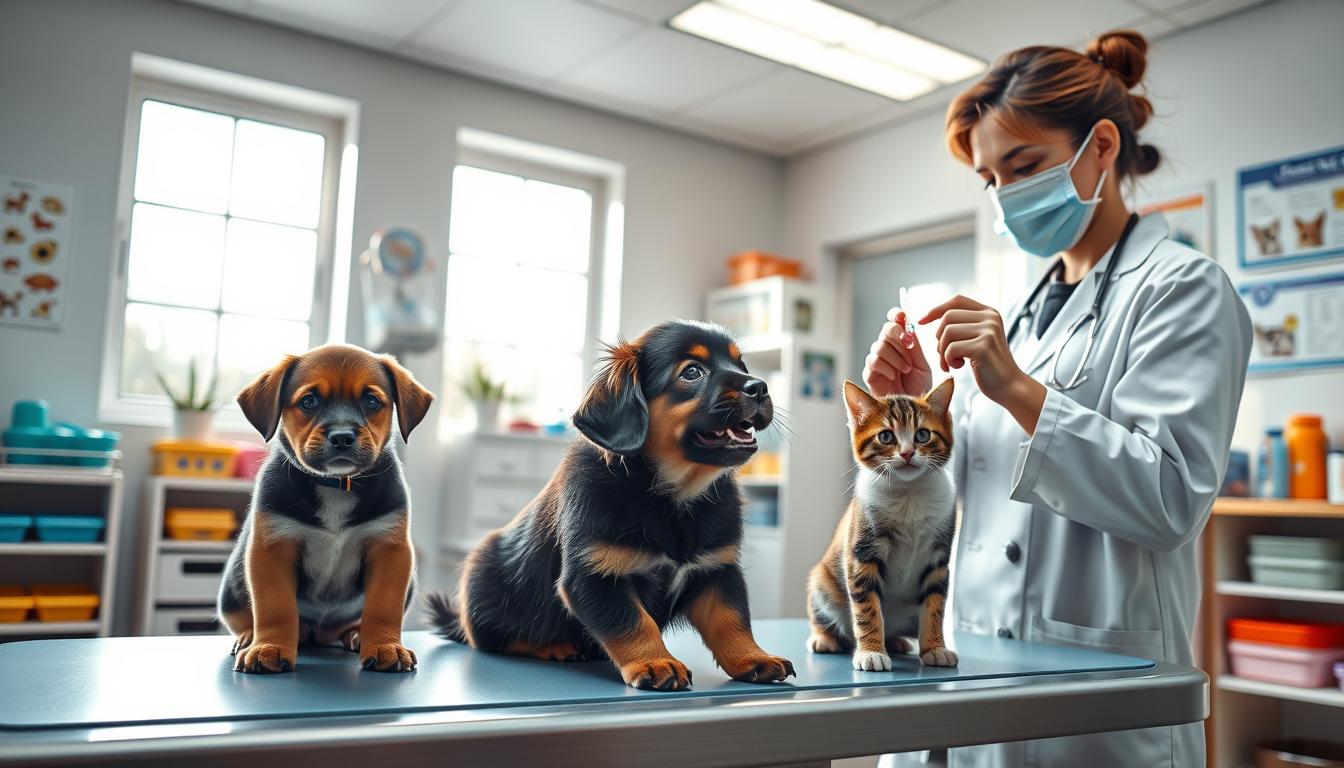As a devoted pet owner, keeping my beloved dog or cat healthy is my top priority. Ensuring they get the right pet vaccinations is crucial. These shots protect them from serious diseases, helping them live a long, healthy life.
In this guide, we’ll look at why pet vaccinations are important. We’ll cover common shots, schedules, and what to expect. Knowing the benefits of preventive care helps me protect my pet’s health and happiness.
Why Pet Vaccinations Matter for Your Furry Pal
Keeping your pet healthy and happy is very important. One key way to do this is by making sure they get the right vaccinations. Vaccines help prevent serious diseases like parvovirus, distemper, and rabies.
Understanding the Risks of Preventable Diseases
Diseases like parvovirus and distemper can be very dangerous if not treated. They spread quickly and can harm your pet’s health or even life. Vaccinations help lower the risk of your pet getting these diseases, giving them a better chance at a long, healthy life.
Ensuring Your Pet’s Overall Health and Well-being
Vaccinations do more than just protect against certain diseases. They also help keep your pet’s immune system strong. This can save you money on expensive medical bills later on. It’s a smart investment in your pet’s health and happiness.
It’s crucial to understand the importance of pet vaccinations, preventing pet diseases, and maintaining your pet’s health and wellness. By protecting your pet, you give them the best chance at a happy, healthy life.
Common Pet Vaccinations

Keeping your furry friend healthy is a top priority. Ensuring they get their core vaccinations is key. These shots protect them from diseases and keep them well.
Core Vaccinations for Dogs and Cats
Dogs need shots for parvovirus, distemper, adenovirus, coronavirus, and rabies. Cats need vaccines for feline panleukopenia, herpesvirus, calicivirus, and rabies. Knowing what shots are important helps keep your pet safe.
| Dog Core Vaccinations | Cat Core Vaccinations |
|---|---|
|
|
Keeping up with vaccinations is crucial. It protects your pet from serious diseases. It’s a small step for big health benefits.
Pet Vaccinations Schedule: When to Vaccinate

Keeping your furry friend healthy and safe is a top priority. A proper pet vaccination schedule is crucial. The timeline for vaccinating puppies and kittens differs from adult pets. It’s essential to understand the specifics to ensure your beloved companion is well-protected.
Puppies and kittens start their vaccinations around 6-8 weeks old. These initial shots are the foundation of their immunity. Booster shots are given at regular intervals to keep their protection strong. Adult pets also need routine vaccinations to maintain their immunity and prevent disease spread.
To help you navigate the pet vaccination schedule, here’s a quick overview:
- Puppies and kittens: Vaccinations begin at 6-8 weeks of age, with booster shots given every 3-4 weeks until they reach 16 weeks old.
- Adult dogs and cats: Annual or triennial (every 3 years) vaccinations are recommended to keep their immunity robust and ensure their ongoing health and well-being.
Staying on top of your pet’s vaccination schedule is crucial. It can mean the difference between a healthy, happy companion and one at risk of preventable diseases. By working closely with your veterinarian, you can ensure your furry friend receives the care and protection they deserve.
| Vaccine | Puppies/Kittens | Adult Pets |
|---|---|---|
| Distemper | 6-8 weeks, 10-12 weeks, 14-16 weeks | 1-3 years |
| Parvovirus | 6-8 weeks, 10-12 weeks, 14-16 weeks | 1-3 years |
| Rabies | 12-16 weeks | Annually or triennially |
| Bordetella | 10-12 weeks, 14-16 weeks | Annually |
| Feline Leukemia | 8-12 weeks, 12-16 weeks | Annually |
Preparing for Your Pet’s Vaccination Appointment
Before your pet’s vaccination, there are important steps to take. Make sure to bring your pet’s medical records and any current medication. This helps the vet team give the best care and answer your questions about the vaccines.
What to Bring and Questions to Ask
Also, prepare a list of questions for the vet. You might ask about recommended vaccines, possible side effects, and how often they’re needed. This way, you can be sure you’re making the best choices for your pet’s health.
The vet team is there to care for you and your pet. They want to make sure you both have a good experience. So, don’t be shy about asking questions. They’re there to help and make sure you’re informed and confident.

